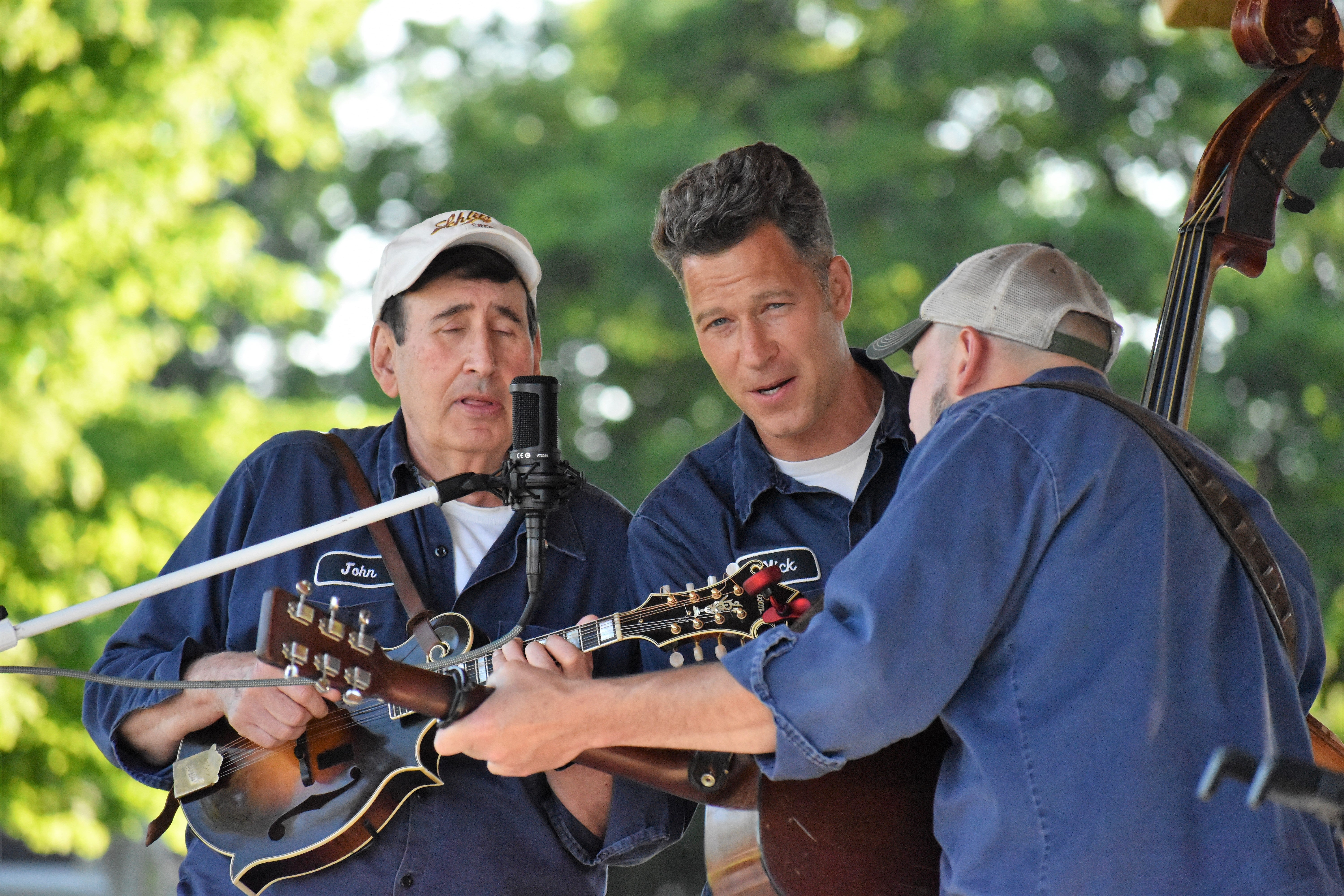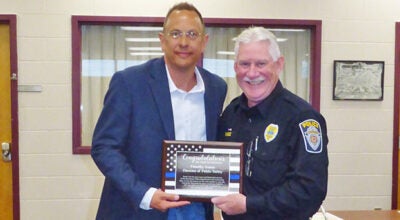Cass interviews two recruiters
Published 10:16 am Friday, February 26, 2010
By JOHN EBY
Dowagiac Daily News
CASSOPOLIS – Two potential county administrator-controller recruiters have been interviewed – former interim Dowagiac city manager Bill Baldridge, who oversaw the 2008 search which led to the hiring of City Manager Kevin Anderson, on Monday – and a University of Wisconsin professor who consults for Voorhees Associates of Deerfield, Ill., Thursday night by public conference call.
Dr. Karl Nollenberger, whose 33 years of public administration experience includes two county administrator jobs, was quizzed by phone by the commissioner committee before an audience in the Kincheloe room.
Nollenberger’s career took him from Iowa to Minnesota and Texas in municipal administration and to Minnesota and Illinois in county administration.
Commissioners began at 6 p.m. in their own chamber upstairs in the 1899 courthouse, heard subcommittee reports, then trooped downstairs to the Kincheloe room, which has been shortened since the old seven-member board met there in the 1990s.
The room was already occupied by Court-Appointed Special Advocates (CASA), who swapped for the upper level to accommodate the board.
Gathered around the old Emergency Operations Center (EOC) table were committee Chairman David Taylor of Edwardsburg, Vice Chairman Ron Francis of Cassopolis, Commissioners Cathy Goodenough of Marcellus, Bill Steele of Vandalia, Charlie Arnold of Cassopolis, E. Clark Cobb of Dowagiac, Johnie Rodebush and Debbie Johnson of Howard Township and Chairman Robert Ziliak of Milton Township, along with Sheriff Joe Underwood, Prosecutor Victor Fitz, Treasurer Linda Irwin, Clerk-Register Barb Runyon, Water Resources Commissioner Bruce Campbell and Road Commission Chairman LeRoy Krempec.
Voorhees quoted to Taylor a $14,500 recruiting fee, plus $5,500 expenses, or $20,000. He expects to spend about 200 hours, including two days in Cass County at the outset to acclimate himself with the county “culture,” commissioners and others in the organization.
Much of the data-gathering he accomplishes through Internet searches and other sources “from a distance.”
He would return to deliver his semi-finalists, discussing “not only what’s on paper, but my impressions of them and the records checks.”
Interviewing five or six finalists would warrant another visit by Nollenberger.
Rodebush elicited that Nollenberger would accept resumes for 30 to 45 days from the time Terry Proctor’s position is advertised. He said while average life expectancy of administrators has lengthened from three years to 6 1/2 years, Cass County was fortunate to have Proctor for such an unusually long duration, 20 years.
“It will be one of the most important decisions you make because you will be deciding where you want to go,” Nollenberger said, “and who will best help you get there. I maintain that the best manager in the world may not be the best person for a particular location at a particular point in time, which is why I need to understand the culture of the community and the culture of the organization.”
A national search is important to keeping the process open and perhaps attracting a candidate in California or Colorado interested in returning to Michigan, he told Johnson, but even before the position is advertised “it’s as important to reach out and make connections in the professional administration community through e-mails and letters.”
Not only does he accept e-mail applications, Nollenberger advised Francis, but “90 percent of applications are e-mailed with their resumes and cover letters attached, to tell you the truth. In terms of promoting the position, it’s mainly done through telephone calls, e-mails and mailings. We take the brochure we put together to people in the profession. I know a lot of county administrators” after serving as president of the 9,000-member City-County Management Association.
He earned his Ph.D. from the University of Illinois in Chicago.
“I ask them if they’re interested, or if they know of somebody who’s interested,” Nollenberger said. “Professional administrators respond more to e-mail than regular mailings.”
Cobb asked Nollenberger how he checks a lengthy list of references when some experience listed might be with companies which no longer exist.
With the eight to 10 strongest candidates he recommends for interviews, at least two background checks have been conducted in half-hour phone conversations.
“Once you select your five or six finalists,” he continued, “we then do two more reference checks. We ask the candidate for a variety of references. Because they are in a public setting, we only do reference checks on ones they give us. Otherwise, we could be compromising their current position.”
But to back up those, Nollenberger said, “It’s super important to check newspapers, criminal backgrounds and credit reports to make sure there aren’t some hidden things out there. One of the best candidates I ever had for a position, when we did a newspaper check, we found out the month before he was walking through the park late in the evening, a teen-ager said something to him that wasn’t nice. He physically abused the teen-ager, got arrested and was pending court. He ‘forgot’ to tell me about that when I asked him if there was anything out there that might embarrass his prospective employer. You can’t find out everything about everybody, and it doesn’t automatically eliminate people, but at least you’re aware of what the situations are so you can evaluate whether it’s a factor for your county.”
Arnold inquired about his teaching load at the University of Wisconsin and whether he had other professional obligations.
Nollenberger teaches three master’s-level public administration courses a semester. Since all his students are working professionals, classes meet Saturdays, 9 a.m. to 4 p.m. The semester ends May 1. “I’m flexible as all get-out Monday through Friday,” he said.
As a consultant, Nollenberger is an independent contractor with Voorhees, “and that’s the only group I’m associated with.” He has worked with Heidi for nine years since he took early retirement in 2001.
Steele wondered whether contacts occurred in the context of meetings or one-on-one encounters.
“I learn a lot more having individual conversations,” Nollenberger replied. “I’d much rather meet with 15 commissioners one on one.”
Sheriff Underwood asked about developing the profile for the job description.
Nollenberger said it does not involve questionnaires.
“Development of the profile for Cass County would be done totally by me. Part of it promotes Cass County to prospective candidates. Part of it is giving an outline of Cass County. Internet searches, copies of the ordinance creating the position. Background information from Chambers of Commerce. All kinds of things so I can get an understanding of the community as well as the organization.
“The other two components are the education and specific experience you want the finalist candidate to have and, even more important, the management traits and style you want. It’s a sit-down interview to get that right person who fits Cass County in 2010.”
Prosecutor Fitz posed a question about the importance of public experience versus private. “I’ve found that public sector experience is extremely important for a county administrator,” Nollenberger said. “Ultimately, that’s a decision for county board members in the hiring process. It’s a firm effort. All of us in the Voorhees group have experience in municipal and county government and we help each other with e-mails back and forth constantly during the day. We’re sharing our experiences with and knowledge of prospective candidates. That’s one of the benefits, quite frankly, of having a group like that, is that base of knowledge.”
How many executive searches have involved him? Fitz followed up.
“I’d have to guess that the people involved with Voorhees have probably been involved with 600 to 700 recruitments over the course of our careers. I only do one or two at a time. I restrict myself because of my academic profession.”
It would be harder to give the “average retention time” for employees placed, he told Arnold.
Referring to other proposals commissioners have reviewed, Francis asked about incorporating in the process a “broad public forum” for employees and community members.
“We ask if you would like us to do that,” Nollenberger indicated. “When I did the city manager position in Oshkosh, one of the evenings we had a public forum the mayor conducted. Oshkosh is another good example. They asked me to meet with people outside the government,” such as Chamber of Commerce and United Way officials.
Rodebush inquired, “Karl, if your firm is hired, would you be asking us to appoint a project manager” and to only work through that liaison?
Responded Nollenberger, “Usually I do ask for one (contact)” from which to obtain copies of budgets and other documents. “If you’re willing, I try to put together e-mail status reports for all 15 board members.”
“As one commissioner, I would insist that only one person you contact with and ignore any other questions from any other county commissioner,” Rodebush said.
Chairman Ziliak observed, “Our search committee is made up such (with a majority of 10 of the 15 commissioners) that all our meetings are public and almost everything that goes on in the search committee is public in nature. We can’t guarantee any confidentiality to these potential candidates, I don’t think. I don’t know how you handle that.”
“I’ve had everything from everything being totally private until they announce the final candidate,” he said, “to the opposite extreme, Columbia, Mo., when I did the city manager search down there. Everything was public from the beginning. Candidates, when they came into town, the first thing that happened was a press conference with the media even before the interview took place. I need to know the lay of the land in advance so I can adhere to that, either way.”
As a result of the private subcommittee meeting Feb. 22 requested by department heads and elected officials, Taylor appointed Irwin, Underwood and Information Systems Director Kerry Collins, who has in the past filled in for Proctor on an interim basis. Collins bowed out, citing his diverse duties, and Fitz was named in his stead.
That meeting also “determined that more work needed to be done before we would be ready to make a recommendation to our full board,” which pushed that meeting back until next Thursday, March 4, with the committee convening at 5:30.
“We had a large contingent and I would characterize it as a good meeting with a healthy exchange of ideas,” Francis commented. “Our role as the committee was to be listeners and get input from this group. The department heads and elected officials want to be more involved in the process of interviewing candidates for both interim and permanent administrator candidates. The process needs to be more open and avoid the perception of the ‘old boy network.’ They asked that a search firm be retained and finalize the job description, which most call developing a profile. In conclusion, we need to develop and follow a process.”






